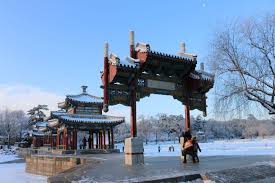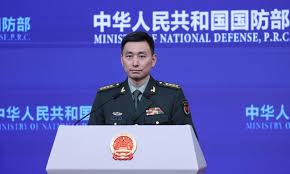Xi Jinping Thought charts course for SARs’ growth

Beijing: Fully and faithfully implementing the principle of “one country, two systems” — a pioneering vision that has been developed further by Xi Jinping Thought on Socialism with Chinese Characteristics for a New Era — holds the key to the long-term prosperity and stability of the Hong Kong and Macao special administrative regions, officials and experts said.
Leveraging the advantages of the “two systems” and safeguarding the country’s sovereignty, security and development interests on the basis of the “one country” principle will bring an even brighter future for the two regions, they said.
Friday marks the 20th anniversary of Macao’s return to the motherland. President Xi Jinping will be in Macao from Wednesday to Friday to attend a gathering marking the event. He will be present at the inauguration ceremony of the fifth-term government of the Macao SAR, China Economic Net reported.
Xi, also general secretary of the Communist Party of China Central Committee, has said on various occasions that maintaining lasting prosperity and stability in Hong Kong and Macao and achieving China’s full reunification are essential to realizing national rejuvenation.
In a meeting in September with then-newly elected and appointed Chief Executive of the Macao SAR Ho Iat-seng, Xi hailed the successful practice of “one country, two systems” with Macao characteristics over the past two decades. He said the principle of “one country, two systems” has proved to be “feasible, realistic and supported by the people”.
As a constitutional principle describing the governance of Hong Kong and Macao since they became special administrative regions of China in 1997 and 1999, respectively, “one country, two systems” is hailed as a great pioneering initiative as its practice is characterized by socialism in the main body of the country and capitalism in two regions, and is unprecedented in human history.
Under the principle, the central government exercises overall jurisdiction over the Hong Kong and Macao special administrative regions and the two regions enjoy a high degree of autonomy. They continue to retain their previous capitalist systems and ways of life, and their laws have remained basically unchanged. Their legal, economic and financial affairs, including trade relations with foreign countries, are independent from those of the Chinese mainland.
The Fourth Plenary Session of the 19th CPC Central Committee, a key tone-setting meeting held in October, reiterated China’s commitment to practicing “one country, two systems”, calling it an important governance system of the country to secure peaceful reunification of the motherland, according to a milestone document adopted by the session.
While highlighting the principle of “one country” is the premise and foundation of the “two systems”, the document said any attempts to challenge the bottom line of “one country, two systems” will not be tolerated.
Speaking in the work report of 19th CPC National Congress in 2017, Xi said the policy of “one country, two systems” has proved to be the best solution to the historical questions of Hong Kong and Macao, and the best institutional guarantee for the long-term prosperity and stability of the two regions after their return to the motherland.
He pledged that “we should ensure that the principle of ‘one country, two systems’ remains unchanged, is unwaveringly upheld and in practice is not bent or distorted”.
Since its return to the motherland, Macao has achieved rapid economic growth, sustained improvements in people’s livelihoods and brought about social stability and harmony.
The SAR’s GDP grew from 51.9 billion patacas ($6.4 billion) in 1999 to 444.7 billion patacas in 2018. Per capita GDP also jumped from 120,000 patacas in 1999 to 670,000 patacas in 2018, which ranks among the highest in the world, according to official data.
Addressing a meeting marking the 20th anniversary of the implementation of the Basic Law of the Macao SAR, the region’s incumbent Chief Executive Chui Sai-on said the most valuable experience drawn from Macao’s success in practicing the “one country, two systems” principle is its fully and faithfully implementing the Constitution and the Basic Law.
“The key is Macao’s accurate understanding and full support of the country’s political system and its core values as well as its close interactions and integrations with the country,” Chui said, “Macao’s fully leveraging the unique strength of the ‘one country, two systems’ principle as well as policy support from the central government helps it secure stability and prosperity.”
Chen Ruihong, a Peking University Law School professor, said the glorious achievements Macao made in the past two decades have demonstrated to the world that the principle of “one country, two systems” is effective. Under the principle, Macao people govern Macao and they enjoy unprecedented, full rights and freedoms, Chen said.
As “one country, two systems” is a pioneering initiative that has no precedent to follow, its application entails an evolving process coupled with new developments.
For example, as Hong Kong’s economy faces challenges, its traditional strengths start to lose their edge while new drivers of growth have yet to emerge. Housing and other issues that affect the daily lives of the people have become more serious concerns.
“To address these challenges and meet the expectations of Hong Kong people for a better life and advance Hong Kong’s development in all sectors, we must stay on a right and steady course, gain a full understanding of the policy of ‘one country, two systems’ and faithfully implement it,” Xi said when addressing the meeting celebrating the 20th anniversary of Hong Kong’s return to the motherland in 2017.
He warned that any attempt to endanger China’s sovereignty and security, challenge the power of the central government and the authority of the Basic Law of the HKSAR or use Hong Kong to carry out infiltration and sabotage activities against the Chinese mainland are acts that cross a red line, and are absolutely impermissible.
Maria Tam Wai-chu, a senior Hong Kong politician and deputy director of the Basic Law Committee of the National People’s Congress Standing Committee, said that the vitality of the motherland remains a strong support for Hong Kong’s development, Xinhua News Agency reported.
Speaking of the monthslong protests that have often led to violent crimes in Hong Kong, Tan said that ending the violence and chaos and returning to development are in the interests of the well-being of Hong Kong’s people, and a return to calm is the best opportunity for the SAR to integrate its development with the country’s growth.
To support Hong Kong and Macao in deepening high-quality cooperation with the mainland, the central government unveiled the national strategy of the Guangdong-Hong Kong-Macao Greater Bay Area in February and encouraged the two regions to leverage their strengths and roles in advancing the Belt and Road Initiative.
For Hong Kong and Macao, the biggest strength of the “one country, two systems” principle is that the nation’s reform and opening-up provides them with a vast arena for development, Xi said when meeting with a delegation from Hong Kong and Macao in Beijing in November 2018.
Wu Zhiliang, president of the board of directors of the Macao Foundation, attributed Macao’s success in practicing the “one country, two systems” principle to the solid foundation of patriotic education in the region.
Sound historical research and education help Macao raise public awareness of the history of the Chinese nation and help people better understand relations between Macao and the motherland as well as the world, Wu was quoted by China News Service as saying.





